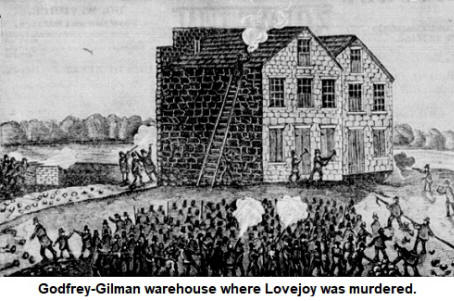Dr. Thomas Mordecai Hope (1813 - 1885)
"The man who bragged he fired the shot that killed Elijah P. Lovejoy."
Dr. Thomas Mordecai Hope was born in Hampton, Virginia, on August
8, 1813. He immigrated to Kaskaskia, Illinois, in 1832. Three years
later he married Miss Elizabeth Pope, daughter of Judge Nathaniel
Pope, and soon afterward moved to Alton, where he followed his
profession of physician and surgeon during his lifetime. For a
while, he kept a drugstore on Broadway with his brother-in-law,
William Pope.
Dr. Hope was a nervous, temperamental Southerner, outspoken in his
views and intolerant of the views of others. This propensity brought
him into many disputes and conflicts. Hope’s partisanship made him a
participant in the famous Rev. Elijah P. Lovejoy riots, and he was
present at the death of Lovejoy in November 1837. It was reported in
the Bloomington Weekly Pantagraph, October 8, 1862, that Hope
boasted that he was the one who fired the shot that killed Elijah P.
Lovejoy on November 7, 1837.
In 1841, President Tyler appointed Dr. Hope U. S. Marshal for this
district. In 1842, he accompanied Abraham Lincoln and James Shields
to Sunflower Island across from Alton, where they were to hold their
duel. When Shields would not back down, Dr. Hope, who was a staunch
Democrat, became angry, saying Shields was bringing the Democratic
Party of Illinois into ridicule. Hope sprang to his feet and blurted
out, “Jimmie, you G—D—little whippersnapper, if you don’t settle
this, I will take you across my knee and spank you.” This was too
much for Shields, who then yielded and the duel was canceled.
During the Mexican-American War, Hope was appointed Surgeon of the
Second Regiment of Illinois Volunteers. Dr. E. B. Price and Dr. Hope
had a quarrel over the appointment as Surgeon, as Dr. Price had been
appointed to the same position by President Polk. Price challenged
Dr. Hope to a duel. They exchanged shots, and Dr. Price was slightly
wounded. Dr. Hope was severely injured in the abdomen, but survived.
After the duel, Dr. Hope returned to Alton and began his medical
practice once again.
Dr. Hope used to tell of an experience he had with William R.
Morrison, our present Member of Congress, while in Mexico during the
Mexican-American War. He found Morrison, who was but a boy at that
time, sitting by the roadside near the line of march, tired out,
footsore and weary, and put him on one of the baggage wagons. But a
short time had elapsed when he again found his protégé sitting
disconsolate by the highway, and was told that a consequential
sub-Lieutenant of the regular army had, with drawn sword, compelled
the crippled soldier-boy to dismount from the vehicle where he was
comfortable riding. This unjust, tyrannical treatment enraged Dr.
Hope. He had Morrison put on another wagon and stationed a soldier
from Alton named McFarlane, and told him to put a bullet through the
aforesaid Lieutenant should he again order the lad off the wagon.
McFarlane obeyed orders strictly, and when the Lieutenant again made
his appearance, he found it wouldn’t be safe to interfere with the
arrangements made, and did not do so.
In the Fall of 1846, Nathaniel Hope, son of Dr. Hope, died at the
age of 2 years and 9 months.
Dr. Hope occupied a prominent place in business circles of Alton,
and was elected Alton Mayor in 1852. He was succeeded the following
year by Hon. Samuel A. Buckmaster.
In 1858, during the Lincoln – Douglas debate in Alton, Dr. Hope kept
interrupting Douglas, who kept his cool until Dr. Hope wouldn’t let
up. Douglas flew into a rage and called the Doctor an ally of the
Abolitionists. Dr. Hope, who was a candidate for Congress from the
Alton district, later gave a speech during a large Democratic
meeting and denounced abolitionism and the “Little Giant,” Stephen
Douglas.
Following the outbreak of the Civil War, his antagonism towards the
North brought him into conflict with the law. In August 1862, Hope
was arrested at his farm, about two miles north of Alton, by Captain
Smith of the 13th Regulars. He was placed within the walls of the
penitentiary in Alton. Hope had long been considered a “rabid
disunionist.” On August 5, 1862 a recruiting officer, wishing to
procure a hall suitable for drilling squads, applied to the doctor
for a hall owned by him. Dr. Hope informed him that “no Federal
officer could have it for any such purpose.” He wanted nothing to do
with “those whose hands are dripping with the blood of his friends
in the South,” and expressed the utmost hatred of the Federal army
and its officers. His remarks were reported to Governor Yates, and
then to Major Flint, who sent Captain Smith to arrest him. Hope took
his arrest calmly, and was taken to the prison. The doctor furnished
fine Havana cigars and Mexican red peppers for the mess hall, which
he said his brother-in-law, General Pope, had brought with him from
Old Mexico. He was released on parole, but had to report semi-weekly
to Major Flint, commanding at Alton.
Dr. Hope, after a brief illness, died October 15, 1885, in Alton,
leaving his wife and a son, Judge Alexander W. Hope, who was just as
controversial as his father. Judge A. W. Hope was the youngest man
elected as mayor of Alton, serving from 1875 to 1878. He was active
in Democrat politics, and was a judge of the city court for twelve
years. Dr. Thomas Hope and Judge Alexander Hope are buried in the
Alton City Cemetery.
Notes: Dr. Hope owned property in Godfrey Township in the Coal Branch area (near Elm Street). He sold the property during his lifetime. Dr. Hope lived for a time two miles north of Alton, possibly on what is today Humbert Road.
